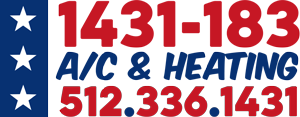For homeowners, the air conditioning and heating system is a crucial part of maintaining a comfortable and healthy living environment.

Knowing when you can handle an HVAC issue yourself and when it’s time to call in a professional can save you time, and money, and ensure your system operates efficiently. Let’s explore some common scenarios to help you decide.
DIY HVAC Repairs
1. Replacing Air Filters: Changing your air filters is one of the simplest and most effective ways to maintain your HVAC system’s efficiency. Dirty filters restrict airflow, causing your system to work harder, which can lead to increased energy costs and potential system failures.
Check your air filters every month, especially during high usage periods, and replace them as needed. This is a quick task that doesn’t require professional help.
2. Cleaning Around Outdoor Units: The outdoor component of your HVAC system needs good airflow to operate efficiently. Leaves, dirt, and other debris can block the unit and reduce its efficiency.
Every few months, and after any major storm, take a moment to clear any debris around the unit. Ensure there’s at least two feet of clearance around the unit to facilitate proper airflow.
3. Checking and Adjusting Your Thermostat: Sometimes the problem isn’t with the air conditioning or heating system itself but with the thermostat. If your HVAC system doesn’t seem to be heating or cooling properly, check to see if the thermostat is set correctly.
Also, consider switching to a programmable thermostat to save on energy bills by automatically adjusting the temperature.
When to Call a Professional
1. Refrigerant Leaks: If your air conditioner is low on refrigerant, it might be due to a leak. Refrigerant leaks not only impair your system’s efficiency but can also harm the environment.
Handling refrigerant requires certification by the Environmental Protection Agency (EPA), so this is a job best left to professionals who have the tools and training to fix the leak safely and recharge the system correctly.
2. Electrical Issues: If you experience issues such as the HVAC tripping the breaker, electrical failures, or strange buzzing noises, it’s time to call a professional.
Electrical problems can be hazardous and are often indicative of more serious issues within your HVAC system. Professionals can safely diagnose and fix these problems, ensuring your system’s safe operation.
3. Strange Noises or Smells: Unusual noises, such as grinding, banging, or squealing, can indicate that something inside your unit needs repair or replacement. Likewise, musty smells might suggest mold presence, while a burning smell could signal electrical problems.
These issues can be complex and require a professional’s diagnosis and repair to ensure everything is functioning safely and effectively.
4. Poor Heating or Cooling Performance: If your HVAC system can’t keep up with the weather, or you notice significant inconsistencies in room temperatures, it could be a sign of systemic issues.
Professionals can evaluate the situation, whether it’s a problem with the ductwork, system size, or mechanical failures. They are equipped to handle these complex issues and ensure your home returns to its optimal comfort level.
Conclusion
While it’s empowering to handle some HVAC maintenance tasks on your own, understanding when a professional is needed can save you from future complications. Regular DIY maintenance like changing air filters and cleaning around units can prevent many problems.
However, for issues like refrigerant leaks, electrical problems, unusual noises, or persistent performance issues, it’s crucial to call a trained professional.
This approach not only ensures your system’s longevity and efficiency but also keeps your home safe and comfortable throughout the year. Remember, when in doubt, it’s always safer to consult with a professional.
If you are experiencing a problem with your air conditioning or heating call us at 512-336-1431 to schedule an appointment. We’ll be glad to come out and take a look at the issue.
1431-183 A/C & Heating proudly serves Round Rock, Georgetown, Cedar Park, Pflugerville, Leander, Liberty Hill, and North Austin.
